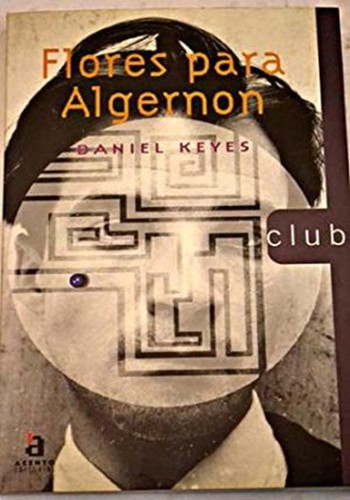Taru Luojola reviewed Flowers for Algernon by Daniel Keyes
Niitä parempia klassikoita
4 stars
Autistin elämää on olla samaan aikaan tyhmä-Charlie ja nero-Charlie.

Paperback, 219 pages
Published Jan. 5, 1997 by Acento Editorial.
Charles Gordon es un disminuido mental que ha llegado a la treintena relativamente integrado en la sociedad. Trabaja, tiene amigos, es simpático y tiene la sensación de ser querido. Acude a clases de lectura con la Srta. Alice para discapacitados y un gran interés por aprender. Su vida dará un giro radical cuando su familia accede a la propuesta de Alice para que forme parte de un experimento científico llevado a cabo con anterioridad con un ratón, Algernon, y con el fin de ver las consecuencias de esa cirugía del cerebro en un humano. La intervención ha sido un éxito, pero Algernon empieza a manifestar cambios de conducta que inquietan a los científicos ¿Afectará de igual manera a Charlie?. Todo este proceso y sus consecuencias son contadas a través de los ‘informes de progreso’ escritos por Gordon y es un recorrido por la mente humana y por el corazón de …
Charles Gordon es un disminuido mental que ha llegado a la treintena relativamente integrado en la sociedad. Trabaja, tiene amigos, es simpático y tiene la sensación de ser querido. Acude a clases de lectura con la Srta. Alice para discapacitados y un gran interés por aprender. Su vida dará un giro radical cuando su familia accede a la propuesta de Alice para que forme parte de un experimento científico llevado a cabo con anterioridad con un ratón, Algernon, y con el fin de ver las consecuencias de esa cirugía del cerebro en un humano. La intervención ha sido un éxito, pero Algernon empieza a manifestar cambios de conducta que inquietan a los científicos ¿Afectará de igual manera a Charlie?. Todo este proceso y sus consecuencias son contadas a través de los ‘informes de progreso’ escritos por Gordon y es un recorrido por la mente humana y por el corazón de los protagonistas.
Autistin elämää on olla samaan aikaan tyhmä-Charlie ja nero-Charlie.
The journal entries, which evolve in linguistic style with Charlie's capabilities, make it an Epistolary novel, but the rapid growth and change puts it more into the Bildungsroman, category. In some ways it resembles a rags-to-riches-to-rags format, echoes of the story of Faust and the concept of forbidden knowledge, and hints of the inescapable destiny which remind me of Arthurian Romance.
The way Charlie's relationships with his co-workers at the bakery, staff and students at the university and Alice change as he changes is important, and they too are changed - though in lesser amounts - as the sun is pulled less towards the earth than the earth to the sun.
Throughout there remains a central decent core to Charlie, with his aspiration to know and his wish to be good, which is very endearing and identifiable.
Poignant, sad, and deeply insightful
I had been assigned a watered-down adaptation of this in Junior High, so I went into this with some knowledge of what the general arc would be. What I didn't expect is that I would be reading until the sun came up, bawling my eyes out, absolutely shaken.
From the very first page, I liked Charlie Gordon. He comes across as innocent and sweet, with good intentions and a very one-dimensional frame of reference to the world. There's a few moments where people ask Charlie things that made me chuckle, like his initial confusion at the Rorschach test, but his attitude is strangely endearing.
The prose in this book is phenomenal. The gradual narrative shift from crude writing to eloquent philosophical insight is kind of an amazing writing trick, and the development of Charlie's awareness is hypnotic to watch.
In a way, I was kind …
Poignant, sad, and deeply insightful
I had been assigned a watered-down adaptation of this in Junior High, so I went into this with some knowledge of what the general arc would be. What I didn't expect is that I would be reading until the sun came up, bawling my eyes out, absolutely shaken.
From the very first page, I liked Charlie Gordon. He comes across as innocent and sweet, with good intentions and a very one-dimensional frame of reference to the world. There's a few moments where people ask Charlie things that made me chuckle, like his initial confusion at the Rorschach test, but his attitude is strangely endearing.
The prose in this book is phenomenal. The gradual narrative shift from crude writing to eloquent philosophical insight is kind of an amazing writing trick, and the development of Charlie's awareness is hypnotic to watch.
In a way, I was kind of reminded of the story of Faust, where a man tries to use his seemingly unlimited knowledge to get out of an inevitable outcome. I'd argue that Charlie is a far more sympathetic character, but watching his mind develop and deteriorate, along with his strained efforts to work against time, made for one hell of a roller coaster.
Beautiful, beautiful story. I haven't cried like that in a while.